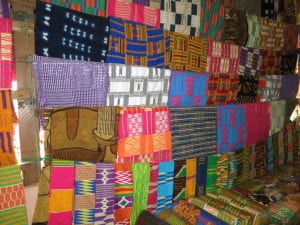When weaving kente fabric, each stitch matters. Each row works with the others to create a
pattern. Colors wind into each row to become a reflection of unity. This is a metaphor for my
internship at Asasse Radio.

Each person has the skill to contribute. There is more to finding the story. There is finding the perspective, collaborating on finding the right locations for interviews, and editing scripts to find the best ways to use audio clips. The Asaase Newsroom reflects these moments each day that I come in.
A word of warning though: please bring your “slippers”. A good pair of slippers or flats make the difference in tracking interviews. The journalist I partnered with, Philipa, deftly handled dirt roads with her slippers. I learned quickly to carry mine as well.
I have also learned the importance of being a confident journalist. There is no time to mince
words before an interview. Interviewees appreciate a journalist deft with communication and
questions. This help them decide to talk to you and trust you with their story.
In the newsroom, I have learned the value of trust. I am committed to hearing the voice of the community. Each day, I am shown ways to smooth the edges of my journalistic technique. I sharpen my thoughts and ability to find a good story. Every time I go out, I have the opportunity to sit and learn from others. More than anything, I want to be an expert listener. I know that I can talk a lot and that I can learn technology quickly. These skills do not help me in the field if I cannot learn to listen.
I believe that listening is a skill many journalists need to learn. We need to listen. I found that
each day in the newsroom brought exciting opportunities to hear stories. We all would sit in a room and discuss the news for the day. The newsroom has a fast turnaround to produce a
presentable story. Although quick deadlines are a news reality, it isn’t easy balancing the
production of stories and being a human being. It is weird to express it that way, I know. When I sit with another person for an interview, I look at the whole person. I am listening to their story, but I am also thinking further. How has this person connected to another life? Can I connect with that other person? What are connections
to other groups or organizations? Is there a problem that reaches others? I thoroughly listen to my interviewees. Sometimes it is easier to be human with interviewees than with colleagues. I find it can be hard for journalists to be human to each other.
Each time I came to the office, I worked at finding someone new to talk to. I would ask them
about their life. I would sit and listen. If I caught myself interrupting, I would note it and move on. I am not only learning how to be a better journalist, but I am finding out how to hold onto my humanity.
It costs me nothing to sit with someone. I will not lose my career if I listen too hard. If someone tells me a story and it makes me sad, then I can be sad. Being a journalist does not mean that I have to lose my heart. I have learned that my heart may be my best asset as a journalist.
When I initially arrived in Ghana, I thought my internship would shape me a bit so I could be a better journalist. My time in Ghana and at Asaase did teach me to listen better, and that is
essential. But I also realize that I had most of what I needed the whole time. I need to remember that I have a good heart and that it belongs in my journalism toolkit too.